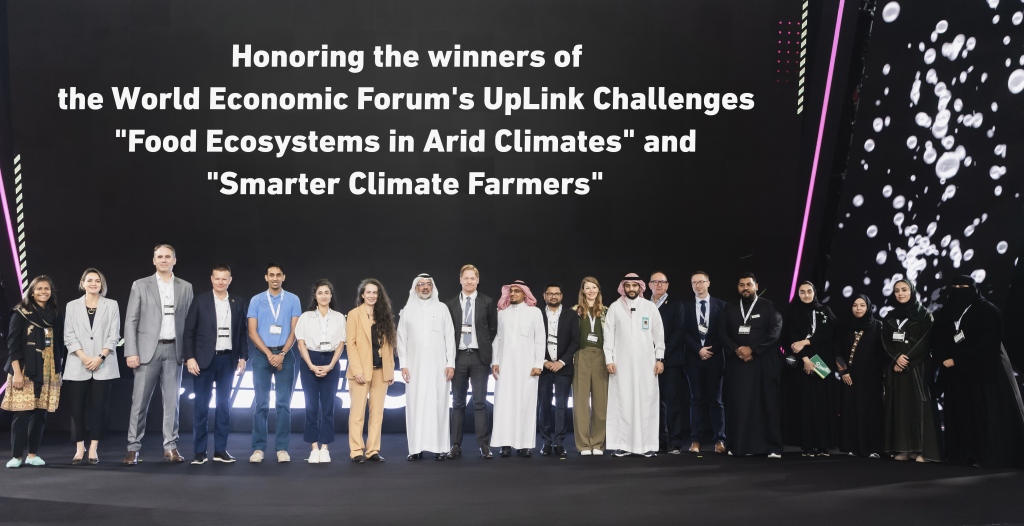
The Ministry of Economy and Planning announces the winners of UpLink’s ‘Smarter Climate Farmers Challenge’
The Ministry of Economy and Planning announced on October 29 the 12 winners of the WEF UpLink ‘Smarter Climate Farmers Challenge’, the second of two food ecosystem innovation challenges launched in partnership with the open innovation platform of the World Economic Forum (WEF).
Abdulrahman Al-Zamil, MEP’s General Manager of External Engagement for Sustainable Development announced the next changemakers as winners of the ‘Smarter Climate Farmers Challenge’, during the InFlavour Expo 2023 in Riyadh, a government-backed world-leading B2B food event in the Saudi capital.
The top innovators were selected after a thorough panel review and selection of the best applications submitted by startups from across the world.
The review process followed the close of submissions in early August in the challenge, a call for solutions using climate-smart agriculture approaches to improve food production, promote better living standards, respond to climate change and lead to the efficient care of the planet’s resources within food ecosystems. According to UpLink, the focus areas of this challenge were knowledge, skills and education; resource efficiency and sustainability; inclusive technology; and innovative financing.
The winners’ innovative solutions for sustainable food production and better living standards will have a positive impact on communities around the world.
WEF UpLink ‘Smarter Climate Farmers Challenge’ closed with a total of 246 submissions received from innovators and startups in Asia, Africa, North America, South America, Europe and Oceania.
Under an agreement signed by the Ministry of Economy and Planning and the WEF UpLink platform, two initiatives - the ‘Food Ecosystems in Arid Climates’ challenge and ‘Smarter Climate Farmers Challenge’ - were launched in January and June 2023, respectively. The challenge was in partnership with the Saudi Ministry of Environment Water Agriculture and supported by a number of local and international expert entities including Barka Fund, Cacao Capital, Saudi Centre for Fourth Industrial Revolution, Efeca, Saudi Federation of Saudi Chambers, INOKS Capital, Kilimo, NEOM, Nestlé, Roots Ventures, United Nations Convention to Combat Desertification (UNCCD) and World Food Forum.
The winners will get funding from a monetary award from the Saudi government, as well as access to WEF and partner-led events, projects and communities; global exposure via WEF’s and UpLink’s digital media channels; and introductions to organizations in WEF’s and UpLink’s network.
The 12 winning startups are:
Alkama (UK)
Ag-tech start-up revolutionizing the way wheat is produced through its FITS liquid ecosystem, which allows farmers to improve crops without using agrochemicals, providing sustainable and cost-effective solutions for wheat farmers, whilst capturing carbon.
AMAATI (Ghana)
With the aim of building sustainable communities, this social enterprise works with farmers, particularly women, in producing and processing the ancient African super grain Fonio, a crop well suited to semi-arid regions.
Amini (Kenya)
A climate tech business that uses AI and satellite technology to build a high-quality environmental data infrastructure for Africa, the starting point for the transition to climate smart agriculture.
BillionCarbon (India)
Tackling the two environmental problems of soil degradation and food waste, it mines nutrients from biodegradable wet waste and converts it to liquid bio-fertilizer.
Dvara E-Registry (India)
An agri fintech start-up which digitizes farmer and farm data and use insights generated through data analytics, to help smallholder farmers adapt to climate smart agricultural practices and get access to institutional lending.
Instacrops (Chile)
Start-up that aims to revolutionize the way fresh food is produced, through an efficient and user-friendly platform with IoT sensors that allows farmers to monitor their crops and maximize crop yield.
Kheyti (India)
Designs low-cost farming solutions that help small farmers increase yield and predictability of produce, such as its affordable, modular greenhouse that uses 90% less water and grows seven times more food and gives farmers a steady dependable income.
MoaTech (UK)
An innovative and rapidly growing R&D crop protection company spun out of the University of Oxford in 2017, moa Technology Limited is dedicated to finding a new generation of safe and effective herbicides to help farmers across the world produce high quality food for all.
Spowdi (Sweden)
A green-tech innovation company that aims through its solar powered water distribution system to enable millions of small-hold farmers to be self-sufficient and profitable with increased crop yields, by using significantly less water and the sun as the only power source.
Unibaio (Argentina)
Making agrochemicals more sustainable, it develops micro-nano carriers made of natural compounds, for both bio and synthetic growth promoters and plant protectors (like fertilizers, pesticides, herbicides, and fungicides).
UpTrade (Pakistan)
A vertically integrated livestock value chain company that works directly with small and mid-sized livestock farmers, leveraging data to improve the quality of livestock and create direct access to markets and tailored bartering programs.
VIA (Australia)
VIA Irrigation Academy seeks to reduce water use while increasing food production, using tools designed to help smallholder irrigators manage their application of water and fertilizer more effectively and sustainably.
- Ends -




























